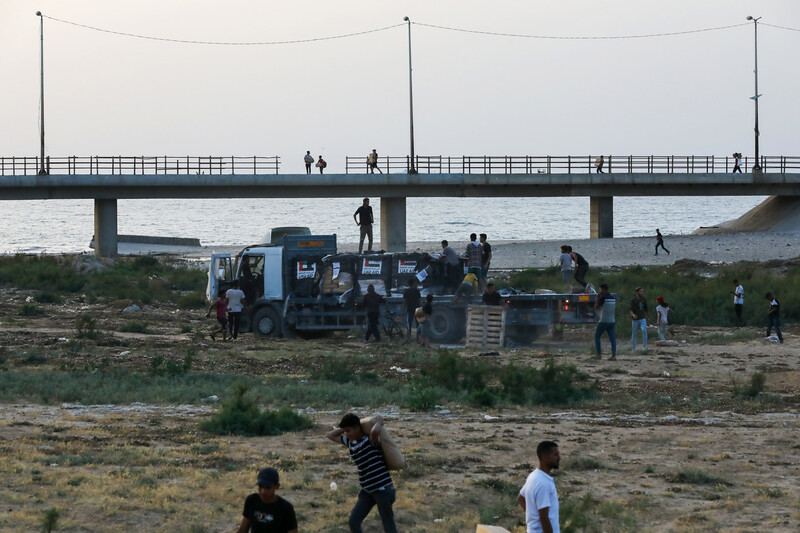The Electronic Intifada 18 January 2025

People carry off aid from a truck in Nuesirat on 18 May 2024. Looters have taken advantage of the huge spike in food proces to steal aid and sell for inflated prices.
APA imagesOn 16 November 2024, nearly 100 aid trucks delivering humanitarian assistance to people in Gaza were looted.
By all accounts, the looting took place in murky circumstances. At short notice the Israeli military ordered the convoy, which had been held for inspection at the Kerem Abu Salem crossing in the south, to depart the crossing and proceed into Gaza via an unfamiliar route.
No reason for the change of route or sudden departure was given, according to UNRWA official Louisa Wateridge, but somehow gangs inside Gaza were lying in wait.
Ninety-eight of 108 aid trucks were looted, prompting the Hamas authorities to issue a stern warning to looters that such action would be “treated with an iron fist.”
The incident highlighted the level of lawlessness in Gaza, where Israel has been targeting the local police, forcing them away from humanitarian assistance supplies and leaving people in Gaza to solve their own civil strife issues.
In a territory where everyone’s lives have been stripped down to a Darwinian struggle for survival, all this creates inevitable chaos.
Now, with a tentative ceasefire agreed that is to take effect on Sunday and is supposed to allow 600 trucks of humanitarian aid to be delivered daily, an orderly distribution is vital for the aid to reach as many as possible as fairly as possible.
Desperation
The increase in humanitarian aid – should it take place, as Israel has form for promising aid and not delivering – should help alleviate food prices in Gaza, which have spiked due to the shortages.
At the moment, such basic essentials as rice, bread and, especially, fresh vegetables have become a luxury for most households. The lack of clean water has added another element to the desperation; fights between parents seeking clean water or food for children at distribution points have become common.
My brother Abdul Rahman Rabie, 38, a father of five in Deir al-Balah, spent hours in October waiting for an aid truck rumored to arrive in his neighborhood. “When it came, people broke into the truck and took everything they could. Even though the driver was shooting in the air to drive them away, they managed to subdue him.”
Within minutes, he said, men showed up selling the same food for three times its price. “I was angry about the looting, but what could I do? I bought a bag of flour for my children, even at the high price.”
With no civil police able to operate, with courts, police stations and local councils either destroyed or rendered powerless, people are left to fend for themselves, often resorting to tribal or familial ties for protection. Even these bonds are strained as resources dwindle, and survival becomes a competition.
Hamas has tried to crack down, announcing a joint operation with tribal councils to improve security. In one incident 20 people were killed in a clash with members of the civil police wearing civilian clothes to escape targeting by the Israeli military.
Gaza’s authorities have warned residents not to deal with looters.
But everything traces back to Israel’s blockade on aid.
Shaaban al-Dalu, an engineer displaced from Gaza City to Deir al-Balah, told The Electronic Intifada that a combination of the authorities’ crackdown on looters and an increase in aid should see stability resume.
“There is a campaign against thieves, and we see that. If the campaign continues and aid flows steadily, prices will decrease. Right now, stolen aid appears in markets at unaffordable rates.”
Devastated economy
Until aid flows freely, however, disorder is unavoidable.
My husband, Khaled, 36, tells of one occasion when he had gone scouting for food.
“As usual, the market was almost empty except for some canned goods. All of a sudden, a group of reckless people broke into the market, stole the canned goods, and fled.”
Although Khaled thought about giving chase, he soon gave up on the idea.
“I wanted to catch up with them. But I told myself they must be hungry. I couldn’t blame them. I don’t see them as criminals. The real criminals are the ones who put them in this position.”
In the midst of these conditions, residents have taken it on themselves to bring order to the turmoil. Some food packages are distributed to the most disadvantaged by volunteers, even as some community leaders try to resolve conflicts and keep peace. Teachers continue to instruct students in temporary schools, and medical personnel put their lives on the line to help others. Such actions serve as a reminder that in times of crisis where authority has collapsed, people still try to maintain their values.
But desperation leads to desperate acts. One of the truck drivers of the convoy that was looted in November told my husband of people waving guns in his face. “The gangs shot at our windows and threatened to kill any driver who did not stop,” the man, who only gave his name as Abu Ahmed, said.
He also noted that despite the presence of the Israeli army there was no attempt to stop the looting. “Israeli tanks were nearby, and an Israeli drone witnessed the entire attack, but no one intervened.”
This disorder is not expected to continue should a ceasefire hold. Even though it seems a clear Israeli policy to divide and set people against each other, it has been contained as most people have tried to maintain some semblance of discipline.
But Gaza’s economy has been devastated. The steady delivery of large amounts of aid may stabilize prices. But it will not address the underlying poverty that is affecting every person in Gaza and will continue to do so for many years.
Somaya Muhammad Mezyed is a teacher and writer based in Gaza.


